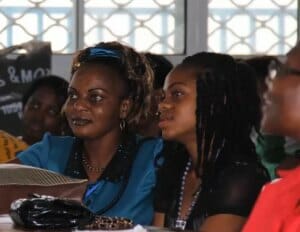
Mar 30, 2015 | Focolare Worldwide
 “Everyone would like to see the Economy of Communion project expand in Africa, out of love for Africa, in order to understand its cultures and practice reciprocity and communion,” said Luigino Bruni, international coordinator of the EoC project, as he looked ahead to the upcoming international gathering in May. That gathering will take place in Kenya, Nairobi, with international representatives from the EoC who will share ideas, innovations and production, but also work, microcredit, inequality and poverty. The African businesses which, from this year, have begun to share their profits with the poor of the world have grown to ten businesses, while twelve businesses are heading in that direction. This is all thanks to a growing spreading of a culture of economy of communion in Africa.
“Everyone would like to see the Economy of Communion project expand in Africa, out of love for Africa, in order to understand its cultures and practice reciprocity and communion,” said Luigino Bruni, international coordinator of the EoC project, as he looked ahead to the upcoming international gathering in May. That gathering will take place in Kenya, Nairobi, with international representatives from the EoC who will share ideas, innovations and production, but also work, microcredit, inequality and poverty. The African businesses which, from this year, have begun to share their profits with the poor of the world have grown to ten businesses, while twelve businesses are heading in that direction. This is all thanks to a growing spreading of a culture of economy of communion in Africa.
This was demonstrated with the recent international conference (February 9-13), which was hosted by Cameroon University, the Catholic University of Buea (CUIB) at the request of the university’s Rector, Fr.. George Kkeze, and by the Bishop, Emmanuel Bushu.
Speakers included Benedetto Gui, currently a professor at Sophia University Institute (Florence, Italy) and Brice Kemguem, National Director for Central Africa in the international ngo named AHA (African Humanitarian Agency). They were accompanied by Steve William Azeumo, from the EoC Commission of the Central African area, Winnifred Nwafor, from the EoC Commission of Fontem, Cameroon, Isabel Awungnjia Atem and Mabih Nji, both graduates of the Sophia University Institute in the role of local facilitators at CUIB.
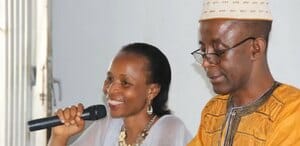 The topics included in the programme have ranged from contemporary economic issues that are dear to the Social Doctrine of the Church and that we find in the values and principles of the EoC, to the great economic and social problems of our time and the shortage of drinking water, epidemics and armed conflicts with weapons of mass destruction.
The topics included in the programme have ranged from contemporary economic issues that are dear to the Social Doctrine of the Church and that we find in the values and principles of the EoC, to the great economic and social problems of our time and the shortage of drinking water, epidemics and armed conflicts with weapons of mass destruction.
Thanks to the video conference connection, it was possible to get to know experiences from around the world. A connection made with the Sophia University Institute facilitated an exchange between the students of the two institutions. After that, two EoC entrepreneurs shared their experiences: Alberto Ferrucci, managing director of a company that produces software for refineries emphasized various aspects of an economy of sharing, a new proposal to solve the economic problems of our age. Teresa Ganzon (manager of the Philippine Rural Bank Bangko Kabayan) reminded participants of the principles of good corporate management that led her to resume her studies in adulthood in order to acquire the necessary knowledge and skills to manage the bank, helping the increase of activity of rural microfinance (micro-credit to farmers and small traders) in the area.
Some Cameroonian experiences were also shared, such as that of chief Fobella Morfaw and his wife, who founded a school in the town of Dschang in 2003 which today consists of a kindergarten, primary and secondary schools; or that of the Civil Engineering Studio at BSE (Bridge Structure Engineering Consulting) that thanks to the great experience of a ‘senior’ partner has now got to the point of getting by and managing well in the midst of a very fierce competition. The studio benefited from the financial and moral support of the Gimou couple; in the days immediately preceding the school Mrs. Marie Madeleine Gimou left this earth and this has deeply moved the participants of the conference. Her husband M. Victor Gimou who has been an engineer for over 23 years continues to support the young studio and to offer access to his library collected throughout his more than 30 years of work.
A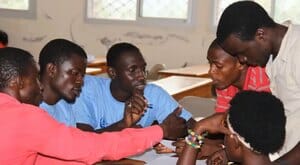 n important part of the program was composed of the workshops in the afternoon, aimed to discuss cases of companies and to prepare projects of micro-enterprises: these had a high attendance and caused amazement because of the quality of the papers presented in the plenary sessions; the best EoC business plan was awarded in the concluding session.
n important part of the program was composed of the workshops in the afternoon, aimed to discuss cases of companies and to prepare projects of micro-enterprises: these had a high attendance and caused amazement because of the quality of the papers presented in the plenary sessions; the best EoC business plan was awarded in the concluding session.
If we want to make a small balance: we were treated to a very fruitful week, thanks to the preparatory work done by the University and the very positive attitude of the young people who volunteered to participate, also encouraged by a recognition of university credits in exchange. There was a very sympathetic register and a cheerful atmosphere throughout the conference: the intervals were often filled with fun activities, a little dance or music. The evening of celebration was simply breathtaking, with songs and dances organized by the young people, with that “little extra atmosphere” that was created by the light of the phones, because there was a sudden blackout.
Participants had very positive impressions: many of them admitted that, in addition to proposing a style of enterprise management, the EoC is also a “proposal of life” that you can put into practice immediately, and many declared they wanted to follow it. In short: a lot of positive vibes and desire to do and work for a better world.
Edc online
Video of the Conference:
https://www.youtube.com/watch?v=RxwKXsEvmn0
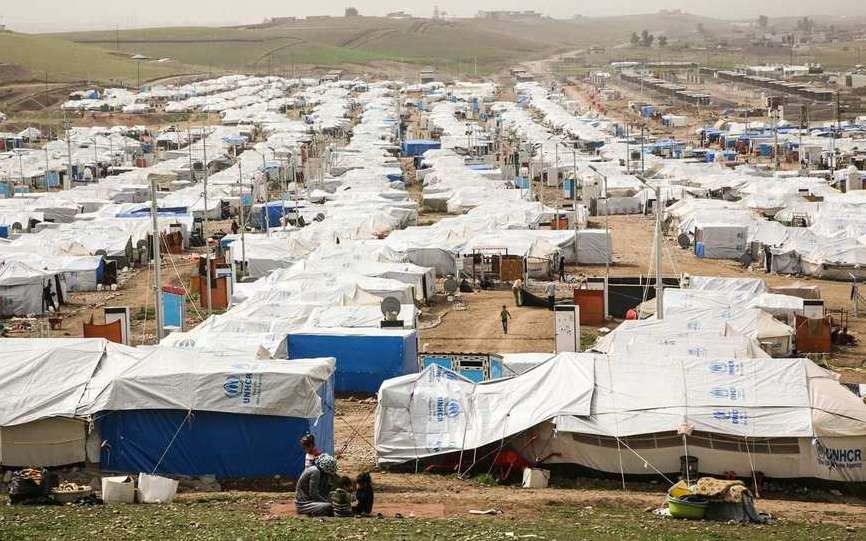
Mar 26, 2015 | Focolare Worldwide

“I live in Erbil, northern Iraq, where I began a school for Kurdish children in 2010,” says Malu Villafane, who born in the Philippines. For the past few years I have been working in a local sanctuary, organising activites and projects. Last August, the shrine was turned into a refugee camp. The cities of Sinjar and Mosul, along with adjacent villages like Qaraqush, Aaramlesh, Bartalla and others, had been invaded by ISIS. The inhabitants fled leaving everything behind, and they took refuge in Kurdistan, with us. There was a very heavy atmosphere in the camp, so much pessimism, children lost and abandoned. Together with the people in charge of the centre, we started up some activities for the teenagers and children, which also involved some of my colleagues from school.”
Over the years, how have Christians, Muslims, Yazidis and other ethnic groups coexisted, such as the Kurds, Turkmen, and so on?
“They respected each other, and did everything together. I work with the Kurds, Turkmen, Arabs and other foreigners. During the crisis many Kurds hosted refugees in their own homes. The Kurdistan people don’t condone this massacre.”
When did the refugee crisis begin in Erbil? Where did they settle? What will they do over the next few months?
“The crisis which caused this forced migration already began in June 2014 and worsened at the beginning of August. The people lost everything: home, work, school. Many of them first took refuge in empty buildings, churches and on the streets. When they could, they stayed with relatives in Erbil. Many non-profit organisations, along with the Church, had to respond to the crisis without any time to prepare. They were in need of everything! Working together we were able to collect a lot of basic necessities. During that period, the temperature rose above 50°C, infernally hot. Now, during the winter it is quite cold. There are not enough tents to house the thousands of families. There are camps without food and water for extended periods of time. Yet, after a few months, the children began to smile and play, to experience something outside the camps, like visiting the swimming pool or public park. The parents see their children’s joy, and rediscover hope. They’ve begun to clean the camp, to cook and give a hand.
After living in this dramatic situation with them, my life was turned upside down. My stay in Iraq took on a very deep meaning: I was living for universal brotherhood.
But does it make sense to work for brotherhood? What pushes you to go on working in the camp?
“If I look at the situation from a human point of view, I become discouraged and feel like escaping. But, if I look at it with the eyes of a hope based on faith, I’m able to go beyond all the suffering I see. I think of the words of the Gospel: “When I was hungry, you gave me something to eat; when I was sad, you comforted me. . .” These words give me strength to face the daily difficulties that I encounter in the camp. It’s not easy to describe all the suffering there is; many of them have lost hope, lost everything. This experience has expanded my heart to welcome everyone as a brother, a sister. It has enabled me to come out of my own comfortable little world and serve others. I want to live for universal brotherhood not because it solves problems, but because, one step at a time, it’s like planting a seed. Peace mostly grows from the small things we do for one another each day.”
What can we do from where we are, to be near to these people?
“I think we need to begin by confronting the topic of “disinformation.” Even though the emergency continues, hardly anyone speaks of it. Spread a culture that welcomes and listens, especially amongst the different races and religions of your cities; promote activities and projects that break down the walls. I thank all of you for your help, and may we continue to believe that Peace is possible.”
Source: Umanità Nuova online
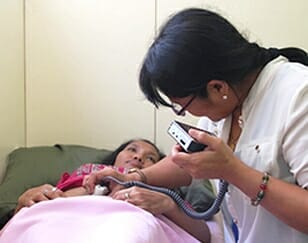
Mar 25, 2015 | Focolare Worldwide
 Working here
Working here
“Being doctors here in the Philippines where there is widespread poverty, my husband and I set up a modest private medical clinic in our small house. It’s certainly was not easy thinking of our colleagues who all have careers in the West. At times we ask if we did well to stay here. But the thought of so many needy people among our own people – children in need of medical care, married couples in need of guidance, the elderly with terminal illnesses. . . The Gospel motivates us to give a personal contribution towards improving society beginning from our own land.” L. R. – Philippines
Moses drawn from the street
“A large family: six children and one on the way, who then died before birth. The mother was saved, but for several days she lingered between life and death. During those days, some military had taken to the hospital in which she was being care for, a newborn that had been abandonend on the street. After some treatment, he recovered but was in need of a family. He immediately found it in that mother who had lost her child. His new parents named him Joseph-Moses, because the hospital is called St. Joseph’s, and Moses because he had been abandoned and found.”H. E. – Congo
I wanted to have my revenge
“I lost my mother just eight days before my marriage. She had been hit by a car, and I decided to have my revenge. I took a bus to the place where the driver lived. On the way, I recalled some words about love of God and neighbour and, little by little, my anger faded. When the other person saw who I was, he turned pale, but I calmed him: I was there only to find out how the accident had happened. After listening to his story, which he shared amidst tears, I tried to put him at peace and the joy promised by the Gospel accompanied me on the return trip.” F.A. – Rome
Source: The Gospel of the Day – March 2015 – Città Nuova editrice
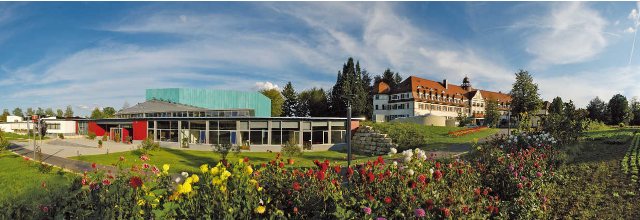
Mar 24, 2015 | Focolare Worldwide

The “Haus Schoenblick” (Schwaebisch Gmuend) Evangelical Training Center
150 heads of evangelical movements and free churches, within the multi-faceted reality of the evangelical world, and with representatives of Catholic movements, posed the query: how to remain faithful to one’s own charism in times of great change?
It is the situation of how various movements that arose over the last century can face the situations today and how they can respond to the various challenges facing Christian ideals, and their searching for new answers, adapted to the times we are living in, though remaining faithful to their roots.
At the “Leaders Convention” Gerhard Pross, moderator and one of the more renowned figures of Together for Europe (network of Christian movements that work together for the benefit of the European continent) and who wanted Focolare President, Chiara Lubich, to be present, as the first successor of Chiara Lubich and as the leader of the Movement.
Maria Voce’s reflection helped to understand the difference between the foundation phases and the “charismatic period,” “full of new, dynamic, luminous surprises,” and the phase of maturity, the “period of creative faithfulness” of a movement, in which, to “grow, develop and multiply” with originality, the inspirational ideas and established by the founder. She went on to recount the Focolare’s commitment to live a widespread leading role of those who live the spirituality and share its aims, and above all, to “go out” more in the “various environments of life and society,” without limiting themselves to living and testifying to unity within the movement, but bringing the spirit and experience of unity to the entire world, “so that all may be one” (John 17.21), the specific aim of the Focolare. “We cannot therefore think of ourselves, Maria Voce affirmed, “we have to “go out” and give of ourselves.” To be able to go beyond ourselves, we need to choose Jesus Forsaken who in his abandonment went beyond himself to unite man once again with God, and unity is one of the main points of the spirituality of unity.
There were members of the evangelical Church, Pentecostal and charismatic movements,
each of which are involved in different way or in social works or on the front of evangelisation, education, political commitment. The “Leaders’ Convention” was created in 1974, well before John Paul II launched in 1998 the communion between movements within the Catholic Church This experience of sharing has therefore continued for some years now. A significant moment which all remembered was in 2000, when with Chiara Lubich at Rothenburg a step forward towards reconciliation was made. In fact the long standing misunderstandings that had developed along the years were cleared up during the “historic moment of mutual forgiveness,” Maria Voce recalled, and which became «a founding experience for communion between movements and communities of different Churches, which later came up with the project “Together for Europe.”
A common step which all look to is the Munich 2016 event, when the “Together for Europe” network will meet for a congress and public manifestation, and will be in turn a step towards the 500th anniversary of Luther’s Reform, offering itself as a prophetic sign of a reconciled and united Europe. On her return from Germany on 4 March, Maria Voce participated in the audience with Pope Francis together with the Bishop-Friends of the Focolare, and conveyed to him the greetings of the 150 representatives of the evangelical movements and their hope in the common commitment for unity. “Very well,” Pope Francis said, when he thanked them. «Your work on the ecumenical front is very important».
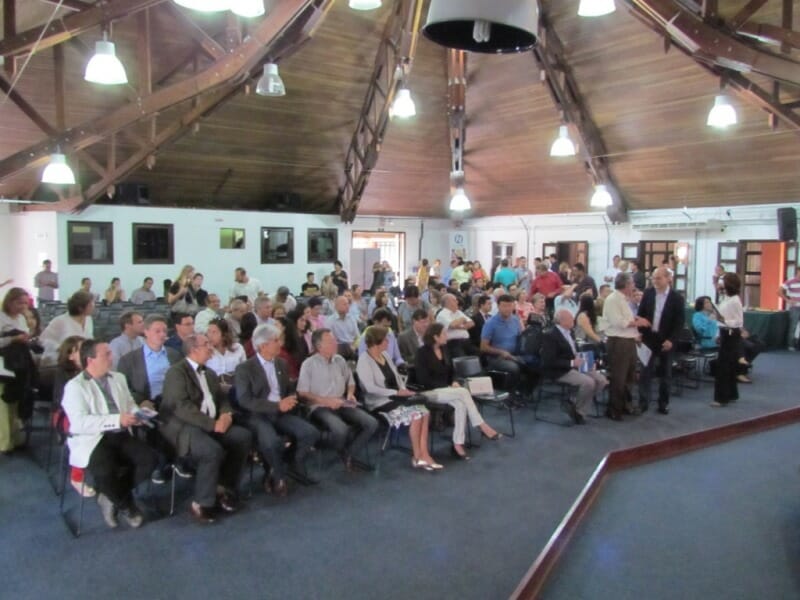
Mar 21, 2015 | Focolare Worldwide
 Saturday 14 March. The “Salão dos Atos” hall immersed in the greens of the Curitiba Barigui Park, was filled with Federal and State Deputies, Mayors, Councillors, Public Officers, youth and academics who came from the Amazon, the Northeast, Brasilia and other cities of Brazil.
Saturday 14 March. The “Salão dos Atos” hall immersed in the greens of the Curitiba Barigui Park, was filled with Federal and State Deputies, Mayors, Councillors, Public Officers, youth and academics who came from the Amazon, the Northeast, Brasilia and other cities of Brazil.
Unusual words echoed in the meeting hall: politics was presented as the “ love of loves” which urges Public Administrators to create projects that respond to the demands of the communities and gives citizens the possibility to achieve their own aspirations.» They all were reminded that «power that enforces but it is love that confers authority.» The word “fraternity” was often repeated, not only as the ethical principle of politics but as “its very substance.” These were the central points of Chiara Lubich’s thought which Maria Voce, President of the Focolare, cited in her message and which were deepened in the various speeches.
This vision of politics that Chiara herself had proposed years ago in the parliaments of the various countries, appeared today like a light in the crisis tunnel Brazil is undergoing. It stirred up new hope, because many testimonials testified to its implementation not only in Brazil, but also in other countries. An innovative panorama, presented in a documentary-video at the start of the event promoted by the Political Movement for Unity (MPPU) of the Focolare, on Chiara’s
The meeting took place simultaneously with two popular manifestations of opposite beliefs and many of the interventions underlined the political, economic and ethical crises, stressing the growing lack of faith in the institutions. «We have come as mediators, called to change this situation through dialogue and fraternity,», said Sergio Previdi, National President of the MPPU.
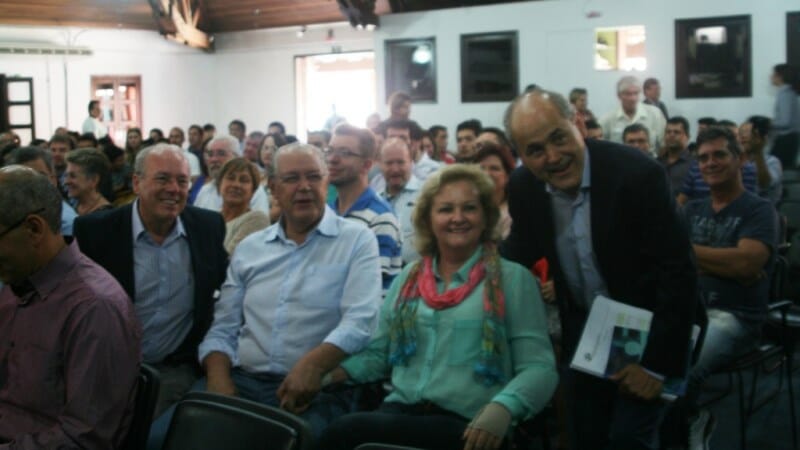 «This is a great challenge. Democracy is not only a technical fact, but needs a soul, We have to re-think politics in order re-humanize it,” affirmed Gustavo Fruet, Mayor of Curitiba. And he cited the innovative political culture of Chiara, which inspired the 2010-2030 programme to make Curitiba “a global innovator city,” already recognised as a model of sustainable planning and as the city of fraternity ».
«This is a great challenge. Democracy is not only a technical fact, but needs a soul, We have to re-think politics in order re-humanize it,” affirmed Gustavo Fruet, Mayor of Curitiba. And he cited the innovative political culture of Chiara, which inspired the 2010-2030 programme to make Curitiba “a global innovator city,” already recognised as a model of sustainable planning and as the city of fraternity ».
Many of the speeches of Councillors and Deputies of various political parties that try, not without effort, to actuate a politics that goes against the current, testified to how they draw from MPPU a “new strength and new commitment.”
«Fraternity means implementing a strategy of unity, seeking dialogue between the majority party and the opposition between institutions and societies, in the mutual effort to achieve common good», affirmed the Mayor of Sorocaba, Antonio Carlo Pannunzio.
Julio Carneiro of MPPU Brazil, mentioned the citadels founded by Chiara Lubich (more than 20as of today), as model-structures of a city, to testify to the impact fraternity has on civil coexistence..
«A new political culture that calls for new men and women», affirmed Prof. Marconi Aurélio Silva, highlighting the urgent need to train the youth in active citizenship, based on fraternity: «given that we are by nature relational beings and not isolated individuals » And he spoke of the many results achieved by the Civitas School in many states of Brazil and the world.
For further information consult: www.mppu.org.br – www.focolares.org.br
Mar 20, 2015 | Focolare Worldwide

 “Everyone would like to see the Economy of Communion project expand in Africa, out of love for Africa, in order to understand its cultures and practice reciprocity and communion,” said Luigino Bruni, international coordinator of the EoC project, as he looked ahead to the upcoming international gathering in May. That gathering will take place in Kenya, Nairobi, with international representatives from the EoC who will share ideas, innovations and production, but also work, microcredit, inequality and poverty. The African businesses which, from this year, have begun to share their profits with the poor of the world have grown to ten businesses, while twelve businesses are heading in that direction. This is all thanks to a growing spreading of a culture of economy of communion in Africa.
“Everyone would like to see the Economy of Communion project expand in Africa, out of love for Africa, in order to understand its cultures and practice reciprocity and communion,” said Luigino Bruni, international coordinator of the EoC project, as he looked ahead to the upcoming international gathering in May. That gathering will take place in Kenya, Nairobi, with international representatives from the EoC who will share ideas, innovations and production, but also work, microcredit, inequality and poverty. The African businesses which, from this year, have begun to share their profits with the poor of the world have grown to ten businesses, while twelve businesses are heading in that direction. This is all thanks to a growing spreading of a culture of economy of communion in Africa. The topics included in the programme have ranged from contemporary economic issues that are dear to the Social Doctrine of the Church and that we find in the values and principles of the EoC, to the great economic and social problems of our time and the shortage of drinking water, epidemics and armed conflicts with weapons of mass destruction.
The topics included in the programme have ranged from contemporary economic issues that are dear to the Social Doctrine of the Church and that we find in the values and principles of the EoC, to the great economic and social problems of our time and the shortage of drinking water, epidemics and armed conflicts with weapons of mass destruction. n important part of the program was composed of the workshops in the afternoon, aimed to discuss cases of companies and to prepare projects of micro-enterprises: these had a high attendance and caused amazement because of the quality of the papers presented in the plenary sessions; the best EoC business plan was awarded in the concluding session.
n important part of the program was composed of the workshops in the afternoon, aimed to discuss cases of companies and to prepare projects of micro-enterprises: these had a high attendance and caused amazement because of the quality of the papers presented in the plenary sessions; the best EoC business plan was awarded in the concluding session.




